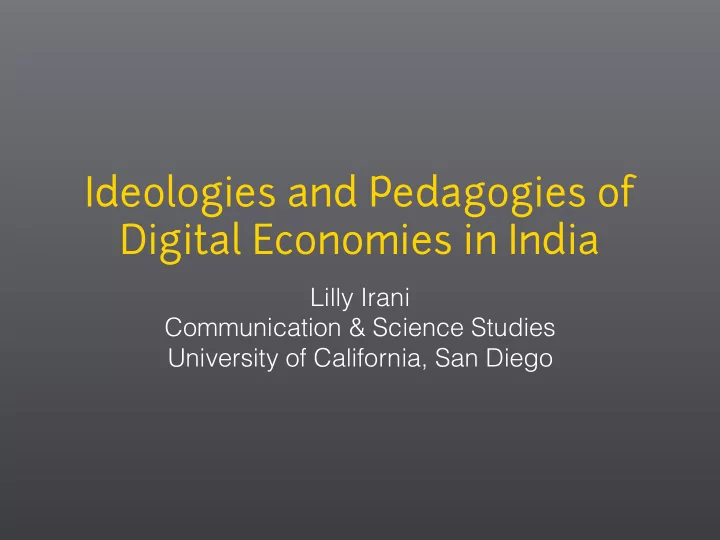

Ideologies and Pedagogies of Digital Economies in India Lilly Irani Communication & Science Studies University of California, San Diego
Speculating in Progressive Futures
Entrepreneurship: High-tech capital’s common sense Government of India - 2012
How “Innovation” Comes to Matter in India The World Bank - 2004 INSEAD, Confederation of Indian Industry GII (now also WIPO sponsored)
Hackathons as Global Labor Form
The Festival Hackathon D-Design’s hackathon: website banner announcing the hackathon
Vipin D-Design staff IIT, IIM alumnus “Ex-founder” Nikhil Dev Software consultant Web software “Ex-founder” consultant Benoy Design grad student IIT, Bombay Cast of characters
Lilly Krish Ethnographer Software consultant Participant-observer Hackathon partner Prem Legal anthropologist Expert on activists, the Indian state Cast of characters
The text of a draft “road safety bill” anchored our speculative talk
Political Friction as Creative Friction
Prototype pages for the website
Hidden pedagogy: “Bias to action” Hiring for the “bias towards action” at the design studio The “bias to action” at Google
Hidden pedagogy: Managing politics
Hidden pedagogy: Fetishizing Ideas
Hidden pedagogy: Infrastructuring non-authorial labor
Hidden pedagogy: The discipline of “viability”
Who can speculate profitably?
The Struggle to Make Users
Appendices
Fast Relations: Coda
A Hackathon on Human Infrastructure Low paid workers as media for technological expression
Hacking on code, workers at hand but at a distance
Slow Code and Infrastructure Publics
Design and its others Design Craft Jugaad Time Future Past Now orientation Social space Market- Kinship Promiscuous network opportunism Rationality consciousness repetition improvisation Promise “authentic” endangered disordered modernity heritage modernity
Figures of Citizenship Nehruvian Post-liberalization “Middle” classes Proxy for masses Portrait of what nation can be Poorer classes producer-citizens Targets of “inclusive growth;” demographic dividend Role of state Manager of planned Facilitator of economy investment and entrepreneurship
Future work • Design thinking, or the cultural logic of transnational citizenship • Amazon Mechanical Turk and the production of cultural data services
Refiguring Citizenship � � A transnational network forum (Turner, 2006): sponsors include Stanford University and India’s Refiguring citizenship: a child National Institute of Design leads Gandhi on the “Design in Education” website. � � � � � � � � � � � � � � � � � � � � � � � � � � � � � � � � � � � � � � � � � �
Individualisms Improvised Word Association Instrument Zindagi Na Milegi Dobara Multiple Intelligences Sri Aurobindo. Howard Gardner, Harvard “A Preface on “India Tour 2012” National Education.” 1921
Shifting Modernities • Developmental modernization as an arrow • Alternate national/cultural modernities (Gaonkar, 2002) • Modernizing individuals
32
From Design to Design Thinking • H. Simon, 1962: “Everyone designs who devises courses of action aimed at changing existing situations into preferred ones.” • Buchanan, 1992: “a new liberal art of technological culture” (Buchanan, 1992)
Speculative Times
Unleashing Entrepreneurs
The Indian Entrepreneur
Background Middle-class India The hackathon Implications Methods and Sites • 12 months ethnographic fieldwork in India • Focal fieldsite: Delhi design consultancy • Participant-observation, 37 interviews beyond the studio
What’s a hackathon? Credit: http://startuptucson.com/
“Problem Citizens” • “Where is India’s Steve Jobs?” (Subramanian, 2011) • Middle-class impatience with democratic processes (Lukose, 2009; Fernandes, 2006) • Intellectuals “talk, talk, talk;” People “wait around for government”
Recommend
More recommend